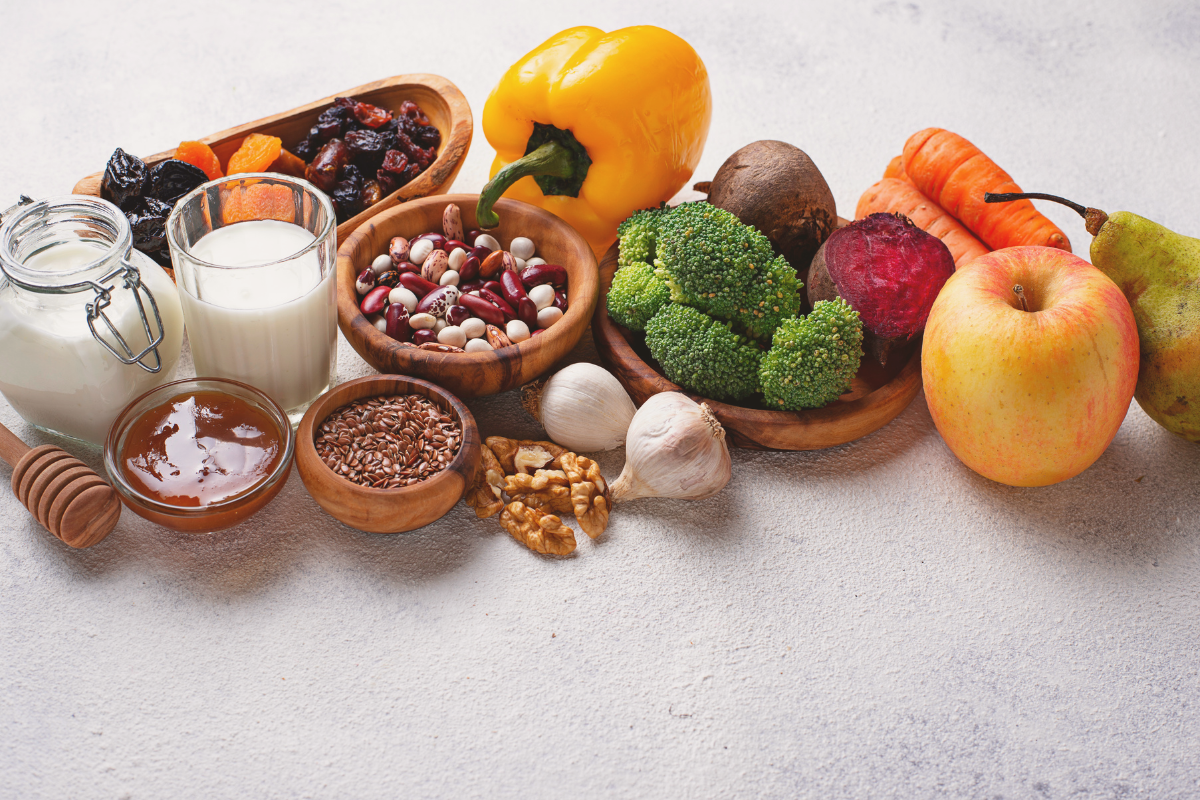20 Best Foods for Optimal Gut Health

KEY TAKEAWAYS
- Gut health is foundational to overall wellness, impacting digestion, immunity, and mental clarity.
- Signs of an unhealthy gut include digestive issues, fatigue, and skin conditions, which can be addressed through diet and lifestyle changes.
- Probiotic and prebiotic foods like yogurt, garlic, and oats support microbial diversity and reduce inflammation.
- Starting the day with gut-healthy drinks such as lemon water or kombucha promotes digestion and nourishes the microbiome.
- Lifestyle adjustments, including stress management and regular sleep, complement dietary changes to enhance gut health.

A healthy gut is essential to your overall well-being, impacting everything from digestion to mental clarity and immune function. Your gut houses trillions of microorganisms—collectively known as the gut microbiome—that play a crucial role in maintaining balance in your body. When this microbiome is thriving, you’ll experience better digestion, increased energy, stronger immunity, and even improved mood regulation. However, when it's out of balance, you may face digestive discomfort, inflammation, and chronic fatigue.
The key to maintaining a healthy gut lies in your daily dietary choices. By eating foods that improve gut health, you create an environment where beneficial bacteria can flourish. This, in turn, helps to balance your microbiome, protect against harmful pathogens, and reduce inflammation. Let's explore the best gut health foods to eat, morning drinks to kickstart your digestion, and lifestyle changes that can help you take charge of your wellness journey.
Understanding Gut Health

Your gut is home to an ecosystem of bacteria, fungi, and other microorganisms collectively referred to as the gut microbiota. These microorganisms break down food, synthesize essential vitamins, and support immune function. Beyond digestion, the diversity and balance of these microbes play a significant role in maintaining your overall health and preventing chronic conditions.
A healthy gut microbiome fosters efficient digestion, optimizes nutrient absorption, and helps your body defend against harmful bacteria, toxins, and pathogens. Research also highlights the connection between gut health and mental wellness through the gut-brain axis—a communication system that links the gastrointestinal system to the brain. This axis means that a balanced gut can reduce anxiety, improve focus, regulate mood, and even support better sleep patterns.
When your gut is unhealthy, harmful bacteria and pathogens can outweigh beneficial microbes, leading to digestive disorders, systemic inflammation, and reduced immunity. An imbalanced gut microbiome may also exacerbate chronic health conditions, including metabolic and autoimmune issues. To nurture your gut, focus on consuming a variety of prebiotic- and probiotic-rich foods, staying hydrated, and making lifestyle choices—such as stress management and exercise—that support a thriving microbiome. By prioritizing your gut, you’re investing in your overall wellness and vitality.
“Your gut microbiome is the cornerstone of your health, influencing everything from digestion to mental clarity.”
Signs of an Unhealthy Gut
Recognizing an imbalanced gut is the first step toward addressing the issue. The following signs often indicate your gut health may need attention:
- Digestive Discomfort: Experiencing frequent bloating, gas, diarrhea, or constipation can signal that your gut microbiota is out of balance. Persistent digestive issues may also indicate inflammation in the gut lining.
- Fatigue and Low Energy: A struggling gut may impair nutrient absorption, such as vitamins B12 and D, which are critical for energy production. This can lead to chronic tiredness and sluggishness throughout the day.
- Skin Issues: Conditions like acne, eczema, and rosacea often stem from gut-related inflammation. An imbalanced gut microbiome can disrupt the skin barrier, exacerbating these problems.
- Frequent Illness: Since much of the immune system is housed in the gut, an unhealthy gut can compromise immunity, leaving you more susceptible to recurring infections, colds, and other illnesses.
- Mood Fluctuations: The gut-brain connection plays a vital role in emotional regulation. Imbalances in gut bacteria can lead to increased stress levels, anxiety, and depression due to disrupted production of neurotransmitters like serotonin.
Other symptoms of an unhealthy gut may include difficulty maintaining a healthy weight, food intolerances, or even unexplained joint pain. If you notice these signs, adopting a gut-healthy diet rich in whole foods, fermented products, and plant-based fibers can restore balance to your microbiome. Combined with healthy lifestyle changes, these adjustments can make a profound difference in your overall well-being.
20 Best Foods for Optimal Gut Health

What foods should you eat for better gut health? These 20 options are packed with probiotics, prebiotics, fiber, and other nutrients to create a thriving gut microbiome. Adding these to your diet consistently can significantly improve your digestive health and overall well-being.
1. Yogurt
Yogurt is rich in probiotics. It contains live cultures like Lactobacillus and Bifidobacterium, which replenish beneficial bacteria in your gut. These probiotics help maintain microbial balance, reduce inflammation, and improve symptoms of digestive issues like bloating or constipation. Opt for plain, unsweetened varieties to avoid added sugars that can feed harmful bacteria.
2. Kefir
A fermented dairy drink, kefir boasts a diverse range of probiotics and a tangy flavor. It is even more potent than yogurt in supporting gut health due to its broader bacterial spectrum, which includes beneficial yeasts. Kefir also contains compounds that soothe the gut lining, making it an excellent choice for sensitive stomachs.
3. Sauerkraut
Made from fermented cabbage, sauerkraut is loaded with probiotics and fiber, promoting digestion and regular bowel movements. The fermentation process enhances the bioavailability of its nutrients, including vitamin C and potassium. Sauerkraut is a versatile addition to salads, sandwiches, or as a side dish.
4. Kimchi
This Korean staple combines fermented vegetables and spices to deliver probiotics, antioxidants, and anti-inflammatory compounds. Kimchi supports microbial diversity and helps improve digestion. It’s a flavorful way to add gut-healthy benefits to your meals.
5. Kombucha
A fermented tea, kombucha contains probiotics and organic acids that aid digestion and maintain the integrity of the gut lining. It also provides antioxidants that reduce oxidative stress in the digestive tract. Choose low-sugar varieties for maximum benefits.
6. Miso
Miso, a fermented soybean paste, is rich in probiotics like Aspergillus oryzae that enhance gut health. It also offers essential vitamins and minerals like vitamin K and manganese. Its savory flavor makes it a delicious addition to soups, marinades, or dressings.
7. Tempeh
Another fermented soybean product, tempeh is high in probiotics and plant-based protein. Its firm texture and nutty flavor make it ideal for stir-fries, salads, or sandwiches. Tempeh also contains prebiotics that nourish beneficial gut bacteria.
8. Sourdough Bread
Sourdough bread is fermented with natural yeast and lactic acid bacteria, making it easier to digest than regular bread. The fermentation process enhances its fiber content and supports the growth of healthy gut bacteria. Opt for whole-grain sourdough for added nutrients.
9. Bananas
Bananas are rich in prebiotic fiber, particularly when slightly unripe. Prebiotics feed beneficial bacteria and help maintain microbial balance. Bananas also contain resistant starch, which promotes digestive health and provides sustained energy.
10. Apples
Apples contain pectin, a soluble fiber that acts as a prebiotic, feeding good bacteria in the gut. Pectin also regulates bowel movements and reduces gut inflammation. Eating apples with the skin on maximizes their fiber content.
11. Garlic
Garlic is a potent source of inulin, a prebiotic fiber that stimulates the growth of beneficial bacteria while deterring harmful microbes. Its antimicrobial properties help maintain a balanced microbiome and support immunity.
12. Onions
Onions, like garlic, are rich in prebiotic fiber that encourages the growth of healthy gut flora. They also contain antioxidants like quercetin, which help reduce inflammation in the digestive tract.
13. Leeks
Leeks are a lesser-known prebiotic source packed with antioxidants and fiber. They support the growth of beneficial bacteria while promoting regular digestion. Add them to soups, stews, or roasted vegetables for a mild, sweet flavor.
14. Asparagus
Asparagus is a top source of prebiotic fiber that feeds good bacteria in the gut. It also offers antioxidants that protect the gut lining and reduce inflammation. Whether steamed, grilled, or roasted, asparagus is a versatile option.
15. Oats
Oats are rich in beta-glucans, a type of soluble fiber that promotes the growth of beneficial bacteria and supports digestion. They also help stabilize blood sugar levels and improve cholesterol, adding to their gut-friendly benefits.
16. Almonds
Almonds are one of the best nuts for gut health, providing fiber, healthy fats, and prebiotics that promote a balanced microbiome. They also contain vitamin E and magnesium, both of which support gut and overall health.
17. Chia Seeds
Chia seeds are packed with soluble fiber, which aids digestion and prevents constipation. When soaked, they form a gel-like consistency that soothes the digestive tract and reduces inflammation.
18. Lentils
Lentils are fiber-rich legumes that support microbial diversity and regular bowel movements. They are also a great source of prebiotics and plant-based protein, making them an excellent addition to soups, salads, or stews.
19. Blueberries
Blueberries are a powerhouse of antioxidants and polyphenols that act as prebiotics, reducing inflammation in the gut. Their high fiber content also supports digestion and microbial diversity.
20. Bone Broth
Bone broth is rich in collagen, gelatin, and amino acids, all of which help repair the gut lining and reduce inflammation. It also improves nutrient absorption and soothes digestive discomfort.
These 20 foods contain nutrients, probiotics, and prebiotics that support a healthy gut and overall wellness. Incorporating them into your daily routine can significantly improve your digestion, immunity, and energy levels. By prioritizing these gut-friendly options, you move closer to a healthier, more balanced microbiome. For additional support, explore tailored supplements from Roots Nutrition to complement your journey to optimal gut health.
Best Morning Drinks for Gut Health

How you start your morning can significantly impact your gut health throughout the day. Choosing beverages that stimulate digestion, replenish beneficial bacteria, and hydrate your system can set the stage for a day of optimal gut function. Morning drinks can also help detoxify the body, balance stomach acidity, and nourish the microbiome, making them a simple yet powerful addition to your daily routine.
“When you nurture your gut, you’re not just improving digestion—you’re laying the groundwork for holistic wellness. ”
Morning Drink Options for Gut Health:
- Warm Lemon Water: Warm lemon water is a gentle way to kickstart digestion. The citric acid in lemons helps alkalize the body, flush toxins from the system, and stimulate the production of digestive enzymes. Drinking warm lemon water on an empty stomach may also promote regular bowel movements and hydrate the body after a night of fasting.
- Apple Cider Vinegar Water: A tablespoon of apple cider vinegar mixed with water helps balance stomach acidity and encourages the growth of healthy gut flora. Its acetic acid content promotes the breakdown of food and improves nutrient absorption. Make sure to choose raw, unfiltered apple cider vinegar for the "mother," which contains beneficial enzymes and probiotics.
- Ginger Tea: Ginger tea is an excellent choice for soothing digestive discomfort and reducing inflammation. Known for its anti-inflammatory and antioxidant properties, ginger stimulates the production of gastric juices and aids in nutrient absorption. This warming beverage can also help relieve nausea and bloating, making it ideal for sensitive stomachs.
- Kombucha: Starting your day with kombucha provides a refreshing probiotic boost that enhances microbial diversity in your gut. Kombucha also contains organic acids that help maintain the integrity of the gut lining and aid in digestion. Its natural effervescence and tart flavor make it a delightful alternative to sugary morning drinks.
- Green Smoothie: Blending leafy greens like spinach or kale with fruits such as bananas and a base of probiotic-rich yogurt or kefir offers a potent mix of prebiotics and probiotics. Adding ingredients like chia seeds or flaxseeds enhances the fiber content, further supporting gut health. This nutrient-packed drink not only nourishes your gut but also provides sustained energy for the day ahead.
Incorporating these morning drinks into your routine ensures that your gut gets the hydration, probiotics, and prebiotics it needs to function optimally. These beverages are easy to prepare and can be tailored to your taste preferences while still delivering powerful benefits to your digestive system.
Gut-Healthy Breakfast Ideas

Your first meal of the day provides a golden opportunity to fuel your gut with nourishing foods that promote digestion and microbial balance. Breakfast should be satisfying and packed with fiber, probiotics, and prebiotics to support gut health. Choosing wholesome, nutrient-dense options ensures lasting energy and optimal digestive function throughout the day.
Satisfying Breakfast Ideas for Gut Health:
- Overnight Oats: Combine rolled oats with almond milk, chia seeds, and a dollop of yogurt for a fiber-rich meal that feeds beneficial gut bacteria. Add toppings like fresh blueberries, sliced bananas, or a sprinkle of nuts for additional prebiotics and antioxidants.
- Probiotic Yogurt Parfait: Layer probiotic-rich yogurt with banana slices, granola, and a handful of fresh berries for a gut-healthy and delicious breakfast. This combination provides probiotics, fiber, and a burst of flavor, making it both nutritious and enjoyable.
- Avocado Toast on Sourdough: Spread mashed avocado on toasted sourdough bread, a fermented option that is easier to digest and supports microbial health. Sprinkle with seeds like chia or flax for added fiber, and top with a drizzle of olive oil for healthy fats that reduce gut inflammation.
- Green Smoothie Bowl: Blend spinach, avocado, kefir, and a frozen banana, then top with almonds, coconut flakes, or a handful of granola. This nutrient-dense breakfast delivers a mix of prebiotics, probiotics, and antioxidants, supporting both gut health and energy levels.
- Vegetable Omelet: Whip up an omelet packed with gut-friendly vegetables like leeks, onions, or asparagus. These prebiotic-rich veggies feed beneficial bacteria, while the eggs provide protein to keep you full and energized.
Starting your day with these nourishing breakfast options supports gut health and provides long-lasting benefits for your energy, mood, and overall wellness.
The Connection Between Gut Health and Overall Wellness
Your gut is often called your "second brain," and for good reason. Beyond aiding digestion, the gut microbiome plays a central role in supporting immune function, mental clarity, and energy levels. The gut-brain axis—a bidirectional communication system between your gastrointestinal tract and central nervous system—demonstrates how a balanced gut can positively influence mood regulation, stress responses, and cognitive function.
A well-balanced microbiome helps reduce systemic inflammation, enhance nutrient absorption, and strengthen the gut lining, a protective barrier against toxins. Conversely, an imbalanced gut can lead to chronic inflammation, weakened immunity, and even contribute to mental health challenges such as anxiety and depression.
You can foster a thriving gut microbiome by making intentional dietary and lifestyle choices, like incorporating prebiotic and probiotic-rich foods, managing stress, staying hydrated, and getting adequate sleep. These adjustments don’t just benefit your digestion—they enhance your overall vitality.
To further elevate your gut health, consider exploring tailored supplement solutions from Roots Nutrition. With products designed to align with your unique wellness goals, you can build a foundation of health that starts with your gut and extends to every aspect of your well-being.
Common Questions About The 20 Best Foods for Optimal Gut Health
What are the best foods to eat for improving gut health?
The best foods for gut health include those rich in probiotics, like yogurt, kefir, and sauerkraut, and prebiotic foods, such as bananas, onions, and asparagus. These foods nourish beneficial gut bacteria, reduce inflammation, and support digestive balance. Including fiber-rich options like oats and lentils also promotes regularity and microbial diversity.
How does the gut-brain axis affect overall wellness?
The gut-brain axis is a communication network connecting the gut and the brain through the nervous system and hormones. A healthy gut microbiome can enhance mood, reduce stress, and improve focus by regulating neurotransmitters like serotonin. Conversely, an imbalanced gut can lead to anxiety, depression, and cognitive challenges.
How can morning drinks support gut health?
Morning drinks such as warm lemon water, apple cider vinegar water, and kombucha stimulate digestion, promote microbial balance, and hydrate the body. Ginger tea and green smoothies provide antioxidants, probiotics, and prebiotics that set the tone for optimal gut function throughout the day.
What are the signs of an unhealthy gut?
Signs of an unhealthy gut include digestive discomfort (bloating, gas, diarrhea, or constipation), chronic fatigue, frequent illness, mood fluctuations, and skin issues like acne or eczema. Addressing these signs with a gut-friendly diet and lifestyle changes can restore balance and improve overall health.
Can lifestyle changes improve gut health alongside diet?
Yes, lifestyle factors like stress management, regular exercise, and adequate sleep play a crucial role in gut health. Stress reduction techniques, staying hydrated, and incorporating mindful eating habits enhance microbial diversity and support the gut-brain axis, promoting overall wellness.





